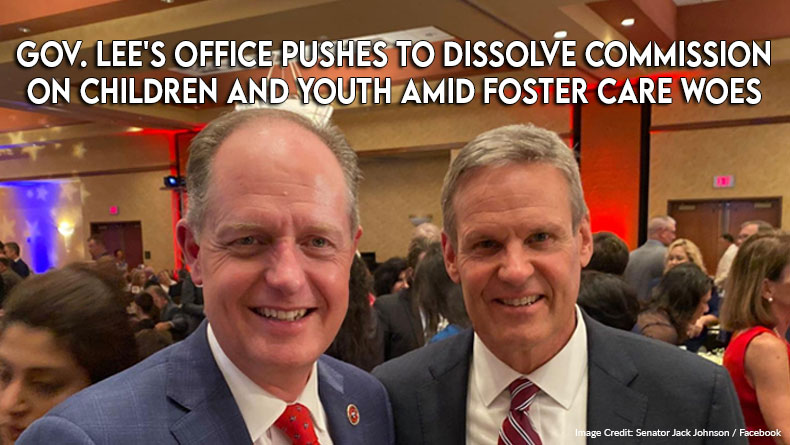Sen. Jack Johnson sponsoring bill.
Image Credit: Senator Jack Johnson / Facebook
By Sam Stockard [Tennessee Lookout -CC BY-NC-ND 4.0] –
Despite a state crisis in which foster children are staying in worker’s offices, Gov. Bill Lee’s office wants to dissolve the independent Tennessee Commission on Children and Youth.
Senate Majority Leader Jack Johnson confirmed he would be presenting Senate Bill 282 Wednesday in the Senate Health and Welfare Committee after a briefing with the governor’s office on the rationale and motive for the move.
“I do know all the responsibilities of that group are being distributed to other parts of the government,” Johnson, a Franklin Republican, said Monday.
The House version of the bill, HB330, sponsored by House Majority Leader William Lamberth, has not been scheduled to be heard.

State Sen. Ferrell Haile, a Gallatin Republican, raised questions about the administration’s plan Tuesday but said he isn’t aware of every detail.
“What I do know is they’ve done a great service. CASA (court-appointed special advocates) is involved. And so I have grave concern,” Haile said.
State Sen. Jeff Yarbro, a Nashville Democrat, was more critical, saying “It’s totally without justification.”
Created by the Legislature, the commission is made up of 21 members appointed by the governor, in addition to an executive director. The commission works with state agencies, juvenile courts, child advocacy groups and other organizations to bolster children services.
But while it is an unbiased group designed to provide state leaders with information, sources familiar with the situation say officials within the governor’s office are upset with the agency’s State of Kids report.
Notably, it points out “Tennessee struggles with foster care instability at a level not seen in the rest of the country,” showing the highest rate of foster care instability in the nation each year from 2016 to 2020. Puerto Rico had the closest rate at 25.9% in 2020 compared to Tennessee’s 33.7% of instability among those in state custody.
Tennessee’s Comptroller also filed a report recently detailing crisis-level shortcomings within the Department of Children’s Services and its foster care program.
The governor’s office made some headway in late 2022 with extra funding for DCS to increase social worker salaries. But Memphis lawmakers say children continue to stay in state offices because of an inability to place them with families.
The state’s level of foster care instability increased to 33.7% from 32% between 2018 and 2020 while the national rate jumped from 15.8% to 16% and then dipped to 14.9%, according to the annual Kids Count report.
“That was a very important report that came out from that group that informed Tennesseans about what was really going on with our children in this state, and to silence their voice at this moment when our children are at their worst is indefensible,” state Sen. Heidi Campbell, D-Nashville, said Tuesday.
The governor’s office did not respond immediately to questions from the Tennessee Lookout, but about two and a half hours after the article was published, spokeswoman Jade Byers sent a statement saying, “The governor is deeply committed to strengthening support for Tennessee children and families, and in addition to more than $190 million to support DCS’s mission, this proposal is another meaningful step to better serve Tennessee children by incorporating important services within child and family-serving state agencies, which includes DCS. To be clear, Tennessee is not cutting services for children or families, but rather, integrating them into state government, meaning that current services will remain intact and be relocated.”
The statement also noted the Department of Children’s Services recently announced children in all but one county are living in transitional homes or nonprofit houses because of Commissioner Margie Quin’s work.
Richard Kennedy, executive director of the commission, did not respond to questions Tuesday, but the Tennessee Lookout obtained the commission’s talking points for the bill in which it contends the state is best served by having an “independent, consolidated” state agency working with several state departments and agencies. It had no findings in its most recent state audit.
“The 21-member commission is a model for citizen engagement and participation and the depth of their knowledge and subject matter expertise lead to broad oversight and improved decision-making processes that improve the lives of Tennessee children, youth and families,” the agency pointed out.
In its 35 years, the commission has acted as a third-party reviewer for the state, noting in one instance it conducted a review of Mountain View Youth Development Center following the suicides of two young men. At the time, Deputy Gov. Jim Henry said without the commission’s review, the state would have had to hire outside counsel at “great expense” or set up a citizen review panel, which would have slowed the process.
The commission’s review “allowed for a cost-effective, credible and timely review and recommendations,” it said.
Yarbro pointed out the Lee administration didn’t propose the reduction in its original budget but is bringing it up “seemingly” because the commission raised awareness about foster care shortcomings.
The commission’s budget for this year is $6.1 million, up from $4.9 million in fiscal 2021-22. But suddenly the entire agency appears to be on the chopping block.
“If the administration were as committed to solving problems facing children in state custody as quickly as it is silencing critics, we’d be in a lot better shape,” Yarbro said. “But I think this effort is petty and abusive.”
Yarbro’s predecessor, Sen. Douglas Henry, worked to establish the commission to be a “voice and advocate” for children, those “who oftentimes don’t have anybody in their lives to advocate for them, the most vulnerable people in our entire society,” Yarbro said.
According to the commission’s report, the percentage of community placements within the Department of Children’s Services fell from 71% in 2016 to 38% in 2021, while the percentage of teens in youth development centers increased to 22% in 2021 from 16% in 2016.
Even worse, 31% of children in state custody were held in juvenile justice centers in 2019 and 29% in 2021 compared to zero from 2016-2018. The number in jail and detention remained between 8% and 12% from 2016 to 2021, according to the report.
“Tennessee is not living up to our legal responsibilities, much less our moral responsibilities when it comes to these children, and we should all be grateful to the commission for trying to shine a light on those problems,” Yarbro said.

The commission’s report wasn’t completely negative. Child poverty dropped nearly 25% between 2019 and 2021, and the number of distressed counties also fell to 10 from 15 over the two-year period, in part because of the governor’s policies on vocational training and broadband expansion.
The number of homeless students decreased over the last three years, but the state saw a slight increase in the number of children sleeping in less safe environments.
Tennessee ranks 47th nationally for program support for families, according to the report. And it pointed out that increasing the state minimum wage, expanding income eligibility for health insurance, paid family leave and a refundable state earned income tax credit are areas for increasing support.
The state ranks 41st in youth mental health with 17.3% experiencing at least one major depressive episode. Problems were exacerbated by the pandemic as the state reported 144 deaths by suicide among those 24 and under in 2020.
Yet substance abuse declined during the pandemic and remains lower than in pre-pandemic years.
The report notes Tennessee is one of 12 states that charges sales tax on groceries. One in five children suffer from food insecurity. A three-month break on the food sales tax is part of the governor’s budget.
It also points out Tennessee is one of 11 states that has opted not to expand Medicaid coverage. Such a move could increase the number of Tennessee children with insurance coverage.


About the Author: Sam Stockard is a veteran Tennessee reporter and editor, having written for the Daily News Journal in Murfreesboro, where he served as lead editor when the paper won an award for being the state’s best Sunday newspaper two years in a row. He has led the Capitol Hill bureau for The Daily Memphian. His awards include Best Single Editorial from the Tennessee Press Association. Follow Stockard on Twitter @StockardSam



One Response
Once again this seems like to me, give them more money to shut them up. More money isn’t the problem. Just like the school system. They have more money than they know what to do with. And it keeps getting worse year after year.
I don’t feel any better about this decision than I did the first time I read about the great committee.